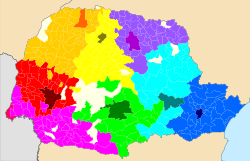RPC (TV Network)
Script error: No such module "Draft topics".
Script error: No such module "AfC topic".
 | |
| Type | Broadcast television network |
|---|---|
| Branding | RPC |
| Country | |
| Availability | Paraná |
| Founded | 29 October 1960 |
| Owner | Grupo Paranaense de Comunicação |
Key people | Guilherme Cunha Pereira (Grupo Paranaense de Comunicação chairman) |
Launch date | 29 October 1960 (as TV Paranaense) |
Callsign meaning | Rede Paranaense de Comunicação |
| Affiliation | TV Globo (1976-present) |
Former affiliations | REI (1960-1967 and 1972-1976) TV Excelsior (1967-1972) |
Official website | redeglobo |
![]() Search RPC (TV Network) on Amazon.
Search RPC (TV Network) on Amazon.
RPC is a Brazilian television network based in Curitiba, capital of the state of Paraná. It was created in 2000 by Edmundo Lemanski and Francisco Cunha Pereira Filho, after the merger of the former Rede Paranaense stations (TV Paranaense, Coroados, Cataratas, Esplanada and Cultura), all affiliated with TV Globo. In 2009, the component stations of RPC abandoned their old nomenclature, used since the merge of the stations in 2000, and started to assume the name of their respective cities. It has eight stations in the state, with RPC Curitiba being the head of the station's network.
History[edit]
The history of RPC began on October 29, 1960, with the founding of the first TV station in the state, TV Paranaense, by businessman Nagib Chede.[1] In 1969, Nagib Chede sold the station to businessmen Francisco Cunha Pereira Filho and Edmundo Lemanski, owners of the newspaper Gazeta do Povo.[2] In 1972, the directors of TV Globo decided to transfer the affiliation contract they had with TV Paranaense since 1970 to TV Iguaçu, owned by former state governor Paulo Pimentel, because it had superior equipment and quality. Paulo Pimentel was then president of the National Renewal Alliance (ARENA) in Paraná and an ally of the president of the military dictatorship, Emílio Médici. However, in 1976, Paulo Pimentel began to have political disagreements with the Brazilian Minister of Education Ney Braga, who was part of the government of Ernesto Geisel. This made Globo transfer its contract again to TV Paranaense.[3]
From then on, the broadcaster reaffirmed the audience leadership maintained until today, in addition to significant improvements in content, arising from investments made by Globo. One of them is Jornal Estado, which was on the air until 1999, when it was replaced by Paraná TV. In the late 1970s, Grupo Paranaense de Comunicação bought TV Coroados de Londrina from José Carlos Martinez and unified the programming of TV Cultura de Maringá, founded in 1974, with that of TV Paranaense, thus forming Rede Paranaense. From the beginning of the 1980s until the mid-2000s, Rede Paranaense expanded its signal to the entire state, as it opened or bought new stations. In 1989, TV Cataratas de Foz do Iguaçu was founded. In 1992, the group acquired TV Esplanada, in Ponta Grossa, until then owned by businessman Pedro Wosgrau Filho and affiliated with Rede Bandeirantes.
In 2000, Rede Paranaense abandoned its old nomenclature and was renamed RPC TV. The same happens with the network stations, which also started to use the Grupo RPC brand. In the same year, it acquired Sistema Sul de Comunicação and sold TV Guaraicá, in Guarapuava, which was renamed RPC TV Guaraicá. The same happened with TV Imagem do Noroeste, from Paranavaí, which changed its name to RPC TV Imagem. In 2001, Grupo RPC inaugurated RPC TV Oeste, in Cascavel. From then on, it started to cover the state of Paraná and consolidated itself as one of the biggest affiliates of TV Globo.
In 2009, RPC TV stations assumed the nomenclature of their respective cities, following a standardization made by the group. In the same year, RPC launched its digital signal, being the pioneer in the southern region of Brazil as follows: Curitiba (March 2012), Cascavel, (November 2012), Guarapuava (November 2012)[4], Ponta Grossa (December 2012), and Paranavaí (December 2012).
On January 1, 2015, the network changed its logo and all stations on the network began to adopt the name RPC.
Broadcasters members[edit]
Stations[edit]

| Callsign | Station | Channel | City |
|---|---|---|---|
| ZYB 391 | RPC Curitiba | 12 (41 UHF) | Curitiba |
| ZYB 402 | RPC Cascavel | 10 (32 UHF) | Cascavel |
| ZYB 408 | RPC Foz do Iguaçu | 5 (35 UHF) | Foz do Iguaçu |
| ZYB 409 | RPC Guarapuava | 2 (32 UHF) | Guarapuava |
| ZYB 392 | RPC Londrina | 3 (42 UHF) | Londrina |
| ZYB 396 | RPC Maringá | 8 (41 UHF) | Maringá |
| ZYB 411 | RPC Paranavaí | 29 (42 UHF) | Paranavaí |
| ZYB 394 | RPC Ponta Grossa | 7 (42 UHF) | Ponta Grossa |
Corporate slogans (translated to English)[edit]
- 2002-2007: Paraná sees itself on RPC
- 2007-2012: RPC TV, your life passes here
- 2012-2014: RPC TV, every day with you
- 2015–2022: Let's go together
- 2022-present: Together we are one
Local programs[edit]
- Bom Dia Paraná (local version of Bom Dia Brasil)
- Bom Dia Sábado PR
- Meio Dia Paraná
- Globo Esporte PR (local version of Globo Esporte)
- Boa Noite Paraná
- Plug
- Meu Paraná
- Caminhos do Campo (local version of Globo Rural)
- Estúdio C
Notes[edit]
External links[edit]
- Official Site Script error: The function "in_lang" does not exist.
- G1 Paraná Script error: The function "in_lang" does not exist.
- GE Paraná Script error: The function "in_lang" does not exist.
This article "RPC (TV Network)" is from Wikipedia. The list of its authors can be seen in its historical and/or the page Edithistory:RPC (TV Network). Articles copied from Draft Namespace on Wikipedia could be seen on the Draft Namespace of Wikipedia and not main one.
